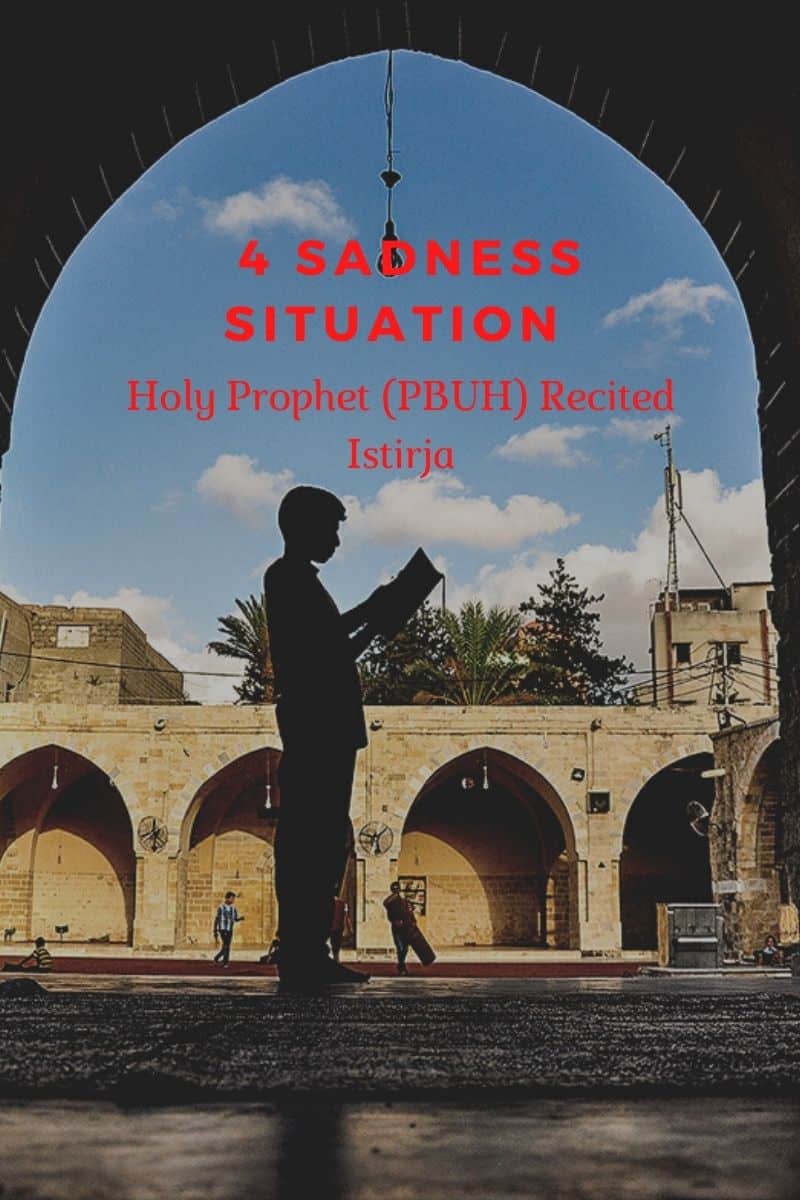
inna lillahi wa inna ilayhi rajiun (إِنَّا لِلَّٰهِ وَإِنَّا إِلَيْهِ رَاجِعُون) is a Quranic verse no 156 stated in Paragraph 2 of Surah Al Baqarah. An Islamic passage is commonly said by Muslims after they learn of the death of a loved one. This term is also used once someone suffers a loss.
Inna lillahiwa Inna ilayhi rajioon is a Qur’an order for muslims. When learning about the loss of a loved one, a Muslim is advised to stay patient. A hadith invites us to recite Istirja’s words: ‘If I take the treasured one on this life of one of my faithful worshipers, and that believer worshipper later seeks the reward of me (for that misfortune), there is no other gift for him save Paradise,” the Prophet (PBUH) said.
it can also be used in difficult situations. As a result, Muslims use it more frequently to express condolences.
inna lillahi wa inna ilayhi rajiun meaning
Only some of the time, we read Quranic verses before fully comprehending and comprehending their true meanings. Therefore, if we examine the meaning of Innalillahiwainnailaihirojiun in-depth, we would discover several interpretations and meanings. According to the Quran;
“And to Allah belongs the endowment of the heavens and the earth’ (Al Imran: 180)
Here is the definition of every word:
Inna: literally ‘, indeed, assuredly, verily’.
Lillahi: We are Allah’s property.
Wa Inna: Wa represents ‘and’ and Inna means ‘really, we’.
Ilayhi is Arabic for ‘towards Him.’
Rajioon: translates as ‘Return.’
English Translation of inna lillahi wa inna ilayhi rajiun
In English, Inna lillahi wa inallah-e-raji’oon (إِنَّا لِلَّٰهِ وَإِنَّا إِلَيْهِ رَاجِعُون)
“Indeed, we belong to Allah, and we must back to Him.” or
“We belong to Allah, and Him should we revert.” Al-Baqarah (Al-Baqarah, 156)
On the event of His (peace be upon Him) son, Ibrahim’s passing, the Prophet (peace be upon Him) said,
‘Our eyes are full with tears, and our hearts are filled with anguish, yet we speak nothing with our lips save what pleases Allah, inna lillahi wa inna ilayhi rajiun .’ (Bukhari)
you can learn Arabic reading with the Quran courses
When to Say inna lillahi wa inna ilayhi rajiun
Here and foremost, it is important to recognize that the phrase is not limited to repeating upon learning of a person’s death. It may, however, be used in any scenario in which you are presented with anguish or tragedy.
Imam Muslim narrates;
Hadhrat Salma stated that she heard Holy Prophet (peace be upon him) saying, “a Muslim who recites inna lillahi wa inna ilayhi rajiun (إِنَّا لِلَّٰهِ وَإِنَّا إِلَيْهِ رَاجِعُون) is never put into distress and Allah compensate him for the endured misery.” (Sahih Muslim)
Imam Qartbi related in his Tafseer when the Prophet’s (peace be upon him) lamp went out. And the Prophet (peace be upon him) uttered inna lillahi wa inna ilayhi rajiun in response. It was also inquired whether there was any kind of discomfort or affliction.
What should we say when we learn about the deaths of non-Muslims?
To begin, it should be noted that the phrase Inna lillahi wa inna ilaihi raji’un is not limited to speaking upon learning of a dead. Rather, it has been mandated to be stated at any time when one is in any form of suffering or is struck by a tragedy.
- Imaam Muslim narrated in his kitaab that Ummi Salama claimed that she reported Rasulullah saying “Any muslim is placed in anguish when he utters Inna lillahi wa inna ilaihi raji’un allahuma ajirni fi museebatee wa akhlifli khairan minha even though that ALLAH recompensates him for the pain he
- In his tafseer, Imaam al Qurtobi mentions an event in which Rasulullah’s lamp went out on one time. Rasulullah exclaimed inna lillahi wa inna ilaihi raji’un in response to this. When Rasulullah was questioned if this was also an ailment or distress, he said that everything that causes difficulty to a believer will be considered distress or sickness.
- The fact that many people were tenacious in their unbelief and many died in their disbelief used to sadden and bring sadness to Rasulullah, therefore ALLAH answered him saying:“ Those who are hastening in disbelief should not grieve you”
- The passing of a non-Muslim must make us sad or upset, but rather of giving respect and compassion, we should consider where this non-Muslim will go and how fleeting our imaan is. Instead, when we learn of the death of a non-Muslim, we should pray to ALLAH to rescue us from a like destiny. (Ameen)
When Holy Prophet (PBUH) Recited Istirja
In four places, the Holy Prophet (PBUH) uttered inna lillahi wa inna ilayhi rajiun . So, what’s the deal? Let us study the Holy Prophet’s (PBUH) Sunnah;
- Whenever a thorn grabs you, say Inna lillahiwa Inna ilayhi raji’un.
- Once bitten by a mosquito, say the name of your Lord by impersonating the sick.
- Once your light goes out, repeat istirja.
- Memorize istirja when your shoelace snaps or shreds.
The Effects of Istirja
The phrases Inna inna lillahi wa inna ilayhi rajiun are not routine or ritualistic. As a result, don’t allow these remarks be taken as a declaration. When chanting this profound dua, one must be aware and reflective.
inna lillahi wa inna ilayhi rajiun is a complete always said that tells us that we will return to Allah on the Day of Judgment so everything external world belongs to Him. Every living creature on Earth will perish. This data encourages us to practice qualities, for which every believer will be rewarded.
When you are in pain or anguish, you might chant Inna Lillahi Wa Inna Ilayhi Rajioon in any language. It is critical to realize that pronouncing Inna lillahi is a prayer as well as a message. If one repeats Inna Lillahi Wa Inna Ilayhi Rajioon with a pure soul and purpose that we are all going to come to Him, he then she should be blessed.


